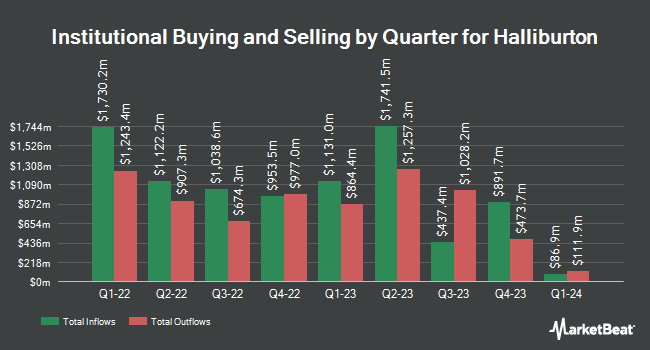J.W. Cole Advisors Inc. acquired a new position in Halliburton (NYSE:HAL - Free Report) in the 4th quarter, according to the company in its most recent filing with the Securities and Exchange Commission. The fund acquired 16,953 shares of the oilfield services company's stock, valued at approximately $461,000.
Other hedge funds and other institutional investors also recently made changes to their positions in the company. MidWestOne Financial Group Inc. lifted its stake in Halliburton by 4.4% during the third quarter. MidWestOne Financial Group Inc. now owns 8,610 shares of the oilfield services company's stock worth $250,000 after purchasing an additional 359 shares during the last quarter. Public Sector Pension Investment Board lifted its stake in Halliburton by 0.3% in the 3rd quarter. Public Sector Pension Investment Board now owns 154,210 shares of the oilfield services company's stock valued at $4,480,000 after purchasing an additional 390 shares during the last quarter. Brown Brothers Harriman & Co. grew its stake in shares of Halliburton by 28.8% during the third quarter. Brown Brothers Harriman & Co. now owns 1,759 shares of the oilfield services company's stock worth $51,000 after buying an additional 393 shares during the last quarter. HBW Advisory Services LLC increased its holdings in shares of Halliburton by 3.9% during the fourth quarter. HBW Advisory Services LLC now owns 10,504 shares of the oilfield services company's stock worth $286,000 after buying an additional 397 shares in the last quarter. Finally, Venturi Wealth Management LLC boosted its holdings in shares of Halliburton by 34.2% during the 3rd quarter. Venturi Wealth Management LLC now owns 1,618 shares of the oilfield services company's stock valued at $47,000 after acquiring an additional 412 shares in the last quarter. 85.23% of the stock is currently owned by institutional investors and hedge funds.
Analyst Ratings Changes
A number of analysts have recently commented on the company. Royal Bank of Canada reissued a "sector perform" rating and set a $34.00 price target on shares of Halliburton in a research note on Thursday, January 23rd. Jefferies Financial Group decreased their price target on Halliburton from $43.00 to $41.00 and set a "buy" rating for the company in a research note on Friday, January 3rd. Morgan Stanley lowered their price objective on Halliburton from $35.00 to $34.00 and set an "overweight" rating for the company in a research report on Monday, November 18th. JPMorgan Chase & Co. cut their price objective on shares of Halliburton from $35.00 to $33.00 and set an "overweight" rating on the stock in a research report on Thursday, January 2nd. Finally, Wells Fargo & Company cut their price target on Halliburton from $39.00 to $34.00 and set an "overweight" rating on the stock in a report on Tuesday, December 17th. Seven research analysts have rated the stock with a hold rating and fourteen have assigned a buy rating to the company's stock. According to MarketBeat, the company currently has an average rating of "Moderate Buy" and a consensus price target of $37.42.
Check Out Our Latest Stock Report on Halliburton
Insider Activity at Halliburton
In other Halliburton news, CFO Eric Carre sold 141,206 shares of the stock in a transaction on Tuesday, February 11th. The stock was sold at an average price of $26.13, for a total transaction of $3,689,712.78. Following the sale, the chief financial officer now owns 127,101 shares in the company, valued at $3,321,149.13. This represents a 52.63 % decrease in their ownership of the stock. The transaction was disclosed in a legal filing with the SEC, which is available at this link. 0.61% of the stock is owned by company insiders.
Halliburton Stock Performance
Halliburton stock traded down $0.75 during trading on Friday, hitting $26.25. The stock had a trading volume of 10,106,921 shares, compared to its average volume of 10,734,410. Halliburton has a 1 year low of $25.16 and a 1 year high of $41.56. The company has a quick ratio of 1.54, a current ratio of 2.05 and a debt-to-equity ratio of 0.68. The stock's 50 day moving average is $27.11 and its two-hundred day moving average is $28.96. The stock has a market cap of $22.78 billion, a price-to-earnings ratio of 9.27, a price-to-earnings-growth ratio of 3.76 and a beta of 1.89.
Halliburton Dividend Announcement
The company also recently disclosed a quarterly dividend, which will be paid on Wednesday, March 26th. Investors of record on Wednesday, March 5th will be paid a $0.17 dividend. The ex-dividend date is Wednesday, March 5th. This represents a $0.68 annualized dividend and a yield of 2.59%. Halliburton's payout ratio is 24.03%.
Halliburton Profile
(
Free Report)
Halliburton Company provides products and services to the energy industry worldwide. It operates through two segments, Completion and Production, and Drilling and Evaluation. The Completion and Production segment offers production enhancement services that include stimulation and sand control services; cementing services, such as well bonding and casing, and casing equipment; and completion tools that offer downhole solutions and services, including well completion products and services, intelligent well completions, and service tools, as well as liner hanger, sand control, and multilateral systems.
Read More

Before you consider Halliburton, you'll want to hear this.
MarketBeat keeps track of Wall Street's top-rated and best performing research analysts and the stocks they recommend to their clients on a daily basis. MarketBeat has identified the five stocks that top analysts are quietly whispering to their clients to buy now before the broader market catches on... and Halliburton wasn't on the list.
While Halliburton currently has a "Moderate Buy" rating among analysts, top-rated analysts believe these five stocks are better buys.
View The Five Stocks Here
MarketBeat has just released its list of 20 stocks that Wall Street analysts hate. These companies may appear to have good fundamentals, but top analysts smell something seriously rotten. Are any of these companies lurking around your portfolio?
Get This Free Report
Like this article? Share it with a colleague.
Link copied to clipboard.